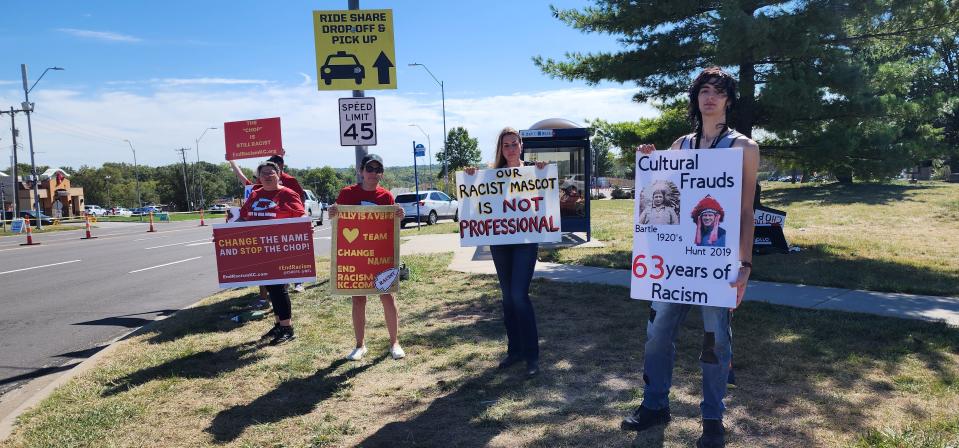Native Americans hope Taylor Swift can help get tomahawk chop banned from Chiefs games
As romance rumors swirl around Taylor Swift and Kansas City Chiefs tight end Travis Kelce, a coalition of Native American leaders are hoping the pop star can help their cause against the tomahawk chop, a hand gesture they've been fighting to get banned from games for decades.
"We remain hopeful that an outside influence like Ms. Swift could be an ally for us in moving the conversation forward on why the chop is a racist act," said a statement issued Monday by Not In Our Honor, a coalition of local Native American leaders and American Indian organizations in the Kansas City metro area.
The gesture is a chopping hand motion meant to mimic the Native American tomahawk, a war hatchet.
"To us, that hand gesture is synchronized racism," Not In Our Honor's statement said.
A Swiftie's guide to Travis Kelce: What to know about Kansas City Chiefs tight end
Watch: Did Taylor Swift put Travis Kelce 'on the map'? TikTok trend captures hilarious reactions
History of the tomahawk chop

Not In Our Honor has been vocal against the use of Native American stereotypes and the misappropriation of their culture at Chiefs games. They were protesting outside the stadium on Sunday when Swift attended the Chiefs 42-10 win against the Chicago Bears.
Swift shared a suite with Kelce's mom, Donna Kelce, during the game. Though the pop star has not commented on the matter, videos show that she did not join in the tomahawk chop when others around her did.
The tomahawk chop, also known as the Arrowhead chop, is a rhythmic forearm motion Chiefs fans make to the beat of a "war chant."
Native American groups also have been fighting for the team to change their mascot from the Chiefs.
"We ask for people to learn about our shared history, the real history of this country, not the sanitized version many learned in school," said Not In Our Honor's statement. "Our culture was stripped from us and we were not allowed to practice it for hundreds of years, yet our culture continues to be mocked for sport and profit despite decades of protest by Natives and Native organizations and recommendations by national psychological, educational and sociological associations."

Tracing back the "Chiefs" 60-plus years of 'cultural appropriation and stereotyping'
'Raise your voices': With Chiefs in the Super Bowl, some Native people say it's time to erase offensive name
Why is the tomahawk chop offensive?

For many Native Americans, the chop has been appropriated from old Hollywood Westerns.
“When I see something like a tomahawk chop, which is derived from television and film portrayals, I find it incredibly offensive because it is an absolutely horrible stereotype of what a native person is,” Vincent Schilling, associate editor of Indian Country Today, told the Associated Press in January 2020 as the Chiefs appeared in their first Super Bowl in 50 years.
“It’s not much more than a cartoon," Schilling said. "My people are not a cartoon. My community is not a cartoon. My heritage is not a cartoon.”
Following the backlash and calls for change, the team made some improvisations, with cheerleaders required to use a closed fist rather than an open palm to do the chop.
That does not solve the problem, said Amanda Blackhorse, a Navajo member of Not In Our Honor.
Blackhorse told USA TODAY last year that the fist motion, supposed to symbolize beating a drum, is not much of an improvement.
“Banging drums in this way is a mockery of our Native communities and Native religions,” said the activist. “I cannot believe that they still get away with all this.”

Head dresses banned
The Chief have previously banned fake headdresses and Native-themed war paint and initiated a working group of local Native people to advise them.
The Chiefs had said that they had discouraged fans from wearing headdresses for years but that the change officially banned anyone from entering Arrowhead Stadium if they have them on.
"These cheesy images are a major reason why people don't want to get to know us," Michael Spears, an actor from a South Dakota tribe, told The Arizona Republic earlier this year. "People think they're honoring us with these mascots and logos, but they're mocking us."
Ally in Swift
Rhonda LeValdo, who is one of the leading voices of Not In Our Honor, hopes to find an ally in Swift.
"It never hurts to have allies that can start a conversation like what we are trying to do," said LeValdo, in an email to USA TODAY. "Sometimes it even helps to have someone from the outside explain why this type of cultural appropriation is problematic."
"In seeing some of Ms. Swift's advocacy for the LGBTQ+ community and what we are trying to do, is be seen as human beings and not relics of the past."
This article originally appeared on USA TODAY: Native Americans hope Taylor Swift can help get tomahawk chop banned

